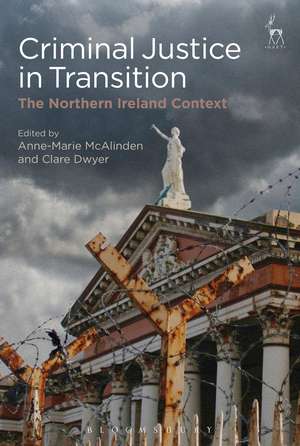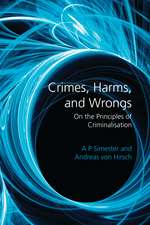Criminal Justice in Transition: The Northern Ireland Context
Editat de Anne-Marie McAlinden, Dr Clare Dwyeren Limba Engleză Hardback – 9 sep 2015
| Toate formatele și edițiile | Preț | Express |
|---|---|---|
| Paperback (1) | 256.06 lei 6-8 săpt. | |
| Bloomsbury Publishing – 27 dec 2017 | 256.06 lei 6-8 săpt. | |
| Hardback (1) | 544.48 lei 3-5 săpt. | |
| Bloomsbury Publishing – 9 sep 2015 | 544.48 lei 3-5 săpt. |
Preț: 544.48 lei
Preț vechi: 776.40 lei
-30% Nou
Puncte Express: 817
Preț estimativ în valută:
104.20€ • 107.64$ • 86.72£
104.20€ • 107.64$ • 86.72£
Carte disponibilă
Livrare economică 05-19 martie
Preluare comenzi: 021 569.72.76
Specificații
ISBN-13: 9781849465779
ISBN-10: 1849465770
Pagini: 416
Dimensiuni: 156 x 234 x 12 mm
Greutate: 0.77 kg
Editura: Bloomsbury Publishing
Colecția Hart Publishing
Locul publicării:London, United Kingdom
ISBN-10: 1849465770
Pagini: 416
Dimensiuni: 156 x 234 x 12 mm
Greutate: 0.77 kg
Editura: Bloomsbury Publishing
Colecția Hart Publishing
Locul publicării:London, United Kingdom
Caracteristici
The book critically examines key aspects of crime and criminal justice in Northern Ireland such as reform of policing, judicial decision-making and correctional services.
Notă biografică
Anne-Marie McAlinden is Reader in Law and Clare Dwyer is Lecturer in Law, both at Queen's University, Belfast.
Cuprins
Part I: Conceptualising Crime and Criminal Justice in Northern Ireland1. Crime and Criminal Justice in Northern Ireland: Conflict, Transition and the Legacy of the Past Clare Dwyer and Anne-Marie McAlinden2. Criminal Justice, Truth Recovery and Dealing with the Past in Northern Ireland Cheryl Lawther3. Bringing Humanity Home: A Transformational Human Rights Culture for Northern Ireland? Colin Harvey4. Criminal Justice Reform in Northern Ireland: The Agents of Change Brice Dickson5. Governing Justice Through Risk: The Development of Penal and Social Policies in a Transitional Context Clare DwyerPart II: The Criminal Justice Process6. Policing in Transition John Topping7. Finding 'Merit' in Judicial Appointments: The Northern Ireland Judicial Appointments Commission (NIJAC) and the Search for a New Judiciary for Northern Ireland John Morison8. Judging and Conflict: Audience, Performance and the Judicial Past Kieran McEvoy and Alex Schwartz9. Prisons and Imprisonment in Northern Ireland Phil Scraton10. Prisoner Reintegration in a Transitional Society: The Northern Ireland Experience Clare Dwyer11. Probation and Community Sanctions in Northern Ireland: Historical and Contemporary Contexts Nicola Carr12. Revisiting the Past: Miscarriages of Justice, the Courts and Transition Marny RequaPart III: Contemporary Issues in Criminal Justice13. Transition, Women and Criminal Justice in Northern Ireland Linda Moore and Azrini Wahidin14. Young People, Crime and Justice in Northern Ireland Deena Haydon and Siobhán McAlister15. Public and Official Responses to Sexual and Violent Crime in Northern Ireland Anne-Marie McAlinden16. Restorative Justice in the Northern Ireland Transition Anna ErikssonPart IV: Overview and Prospects17. 'Doing' Criminal Justice in Northern Ireland: 'Policy Transfer', Transitional Justice and Governing Through the Past Anne-Marie McAlinden and Clare Dwyer
Recenzii
...an excellent opportunity for the reader to access a stimulating collection of work written by experienced researchers within the context of transitional justice...It is quite simply an outstanding achievement.
... this is a very impressive collection - wide-ranging, informative, topical and insightful. It will certainly appeal to anyone interested in criminal justice in Northern Ireland but the issues it raises have a resonance far beyond there, and so it will also appeal to academics, researchers, policy-makers and others interested in transitional contexts and in the dynamics of institutional reform more generally.
... this is a very impressive collection - wide-ranging, informative, topical and insightful. It will certainly appeal to anyone interested in criminal justice in Northern Ireland but the issues it raises have a resonance far beyond there, and so it will also appeal to academics, researchers, policy-makers and others interested in transitional contexts and in the dynamics of institutional reform more generally.











